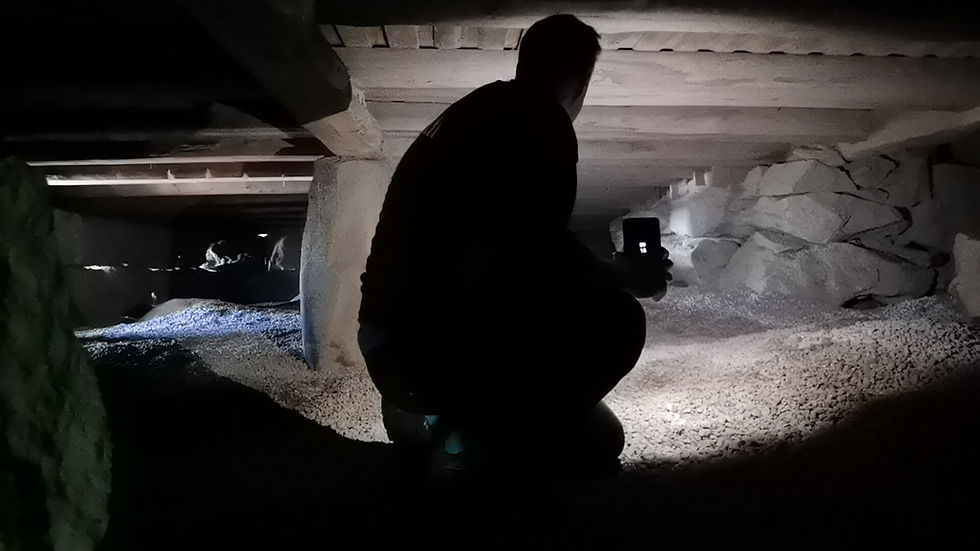The Vultures and the Silence: Defending Gamified Cohousing and Democracy in Finland
- Pedro Aibéo
- Aug 28
- 4 min read
Why resistance to change often looks like fear, and why it should never go unchallenged.

After years of constructive press, visibility, and international recognition, the winds have shifted. I’ve come to expect that when ideas begin to challenge the status quo and gain traction, resistance follows. That resistance has now taken form in two troubling ways: a series of misleading articles, and sudden aggressive actions from city officials.
Most recently, YLE Lappeenranta and Etelä-Saimaa have published reports filled with factual errors, omissions, and narrative distortions. At the same time, city authorities have acted without warning or dialogue, issuing harsh statements and visiting properties unannounced. These attacks are not only directed at me, but at the broader vision of Gamified Cohousing.
And yet, this vision is not one of confrontation. It is about cooperation, a way of reactivating Finland’s abandoned cultural heritage through modest, phased renovation and community participation. Gamified Cohousing transforms disused buildings like old schools and train stations into shared homes. Instead of demolishing or fully redeveloping, we secure basic safety, heating, water, electricity, fire protection, etc and allow the rest to emerge organically with those who want to live there. This is what makes it affordable. This is what makes it communal.
But that approach requires a flexible mindset from city authorities. Full permits come later, once the project has stabilised. That’s the social innovation we offer: a form of living that’s sustainable and democratic from the ground up. But if city departments or media intervene mid-process, misunderstanding the method and broadcasting incomplete information, it can cause real harm. It creates fear, pushes residents away, and unravels the very financial model that allows the work to continue.
The damage is real. Tenants have left. Fear has spread. And in Finland, fear often stems not from the press, but from authority. The silent weight of institutional language carries power, especially when it arrives unannounced and unexplained.
Over the past weeks, city officials have entered the properties of Gamified Cohousing in Finland without notice, issuing documents heavy with accusations but light on dialogue. Anyone who has worked with municipalities knows the dysfunction: internal miscommunication, fragmented responsibilities, and a culture where gossip sometimes travels faster than decisions.
I’ve lived as a foreigner for 24 years. Today I write from Australia, where I’m working with Professor John Keane to complete my PhD on Architectural Democracy. We speak often of these dynamics: how democracy is not just about elections or public buildings, but about resisting arbitrary power and ensuring those in office remain accountable to those they serve.
What we are seeing now in parts of Finland is not just bureaucratic inefficiency. It is an abuse of power, when assumptions replace inquiry, when fear replaces dialogue, and when the press publishes without verification. Democracy is most at risk not when it is attacked, but when it is eroded quietly through silence, sloppiness, and the weaponisation of suspicion.
Despite the current storm, our work has received years of national and international recognition. We’ve been nominated for EU-level awards. The Gamified Cohousing model has inspired others. That success, I now suspect, has also attracted the vultures.
I’ve invested every cent I earn, from projects abroad like the school I’m now designing in Nepal for the Korean Development Agency, into restoring heritage buildings in Finland. Not for profit, but to live and test a new democratic model of architecture. I don’t ask people to move into finished apartments. I invite them to rebuild and reimagine homes together.
I have dedicated my life to the arts, from theatre, music, and video to drawing. That background is not separate from my architectural practice, it is its foundation. In every Gamified Cohousing project, we have integrated cultural spaces and activities for local communities from day one.
Which large renovation company does that? It’s not in their interest, because their goal is profit. Ours is community. To punish us for creating spaces that are social, participatory, and alive is not only unfair, it is a decision against the best interests of the very citizens these cities are meant to serve.
And if not our model, then what is the alternative?
You must submit detailed plans before even knowing the building well nor the people. You do it all digitally, pay the fees, follow rigid codes, often demolish most of what’s there, and build new. Then you offer it at high prices, because you’ve had to invest heavily upfront.
This is the dominant model, expensive, impersonal, exclusionary. Is this how communities are created? Who moves in at the end? The people who lived there? Or the ones who can afford it?
If needed, I’m prepared to publish correspondence, within GDPR limits, to correct false narratives. I’ve already contacted the journalists and officials involved, asking them to revise their statements.
I hope they will. If not, I will respond as I always have, with facts, transparency, and public accountability.
Because criticism, when honest, is welcome. It is care. But distortion is something else. And it deserves to be called out.
I hope common sense will prevail. I want my work in Finland to continue. But if it cannot, if goodwill and years of civic contribution are no longer enough, I will take these ideas elsewhere.
Democracy, after all, must be practiced where it is most needed.
Pedro Aibéo Sydney 29.08.2025
Comments